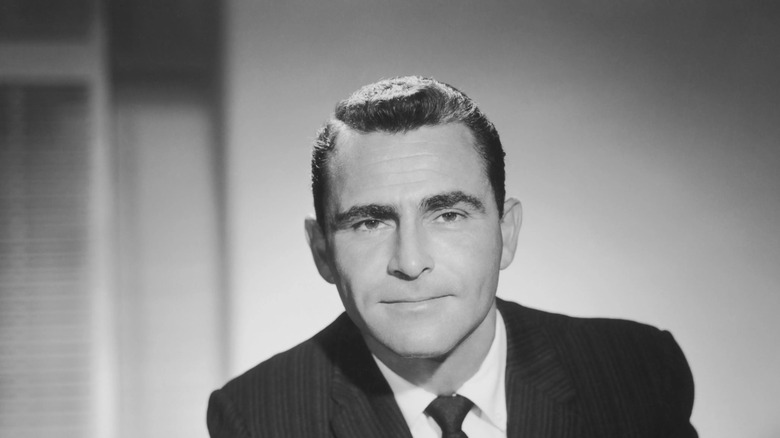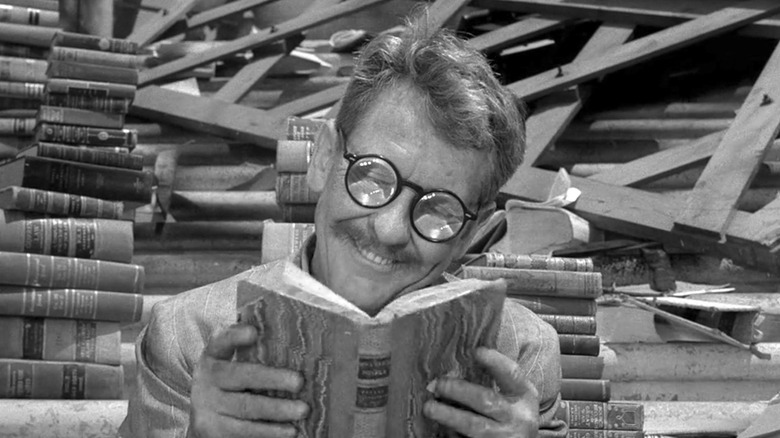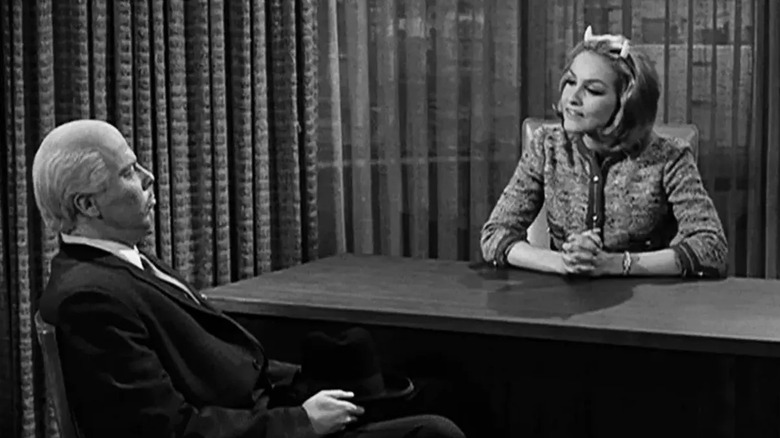A Classic Batman Villain Starred In One Of The Twilight Zone's Earliest And Best Episodes
Before everyone started talking about glitches in the Matrix to describe spooky goings-on, anything weird or potentially inexplicable was like entering "The Twilight Zone." Some old timers still use this comparison, possibly humming an annoying rendition of the theme tune for extra effect. You can't blame them, really, because few TV shows have created a cultural footprint the size of Rod Serling's visionary series. Three revivals, a patchy anthology film, and a range of other media have kept the show firmly in the public consciousness, but none have quite matched the quality of the original hosted by Serling himself. With Serling's assured presence and teleplays from some of the best writers of sci-fi and speculative fiction of the day, "The Twilight Zone" was packed with iconic episodes.
"Twilight Zone: The Movie" opened with two guys (played by Dan Aykroyd and Albert Brooks) chatting about their favorite episodes, and they certainly had plenty to choose from. Essential episodes that everyone should watch at least once include "The Monsters are Due on Maple Street," "Nightmare at 20,000 Feet" (superbly remade by George Miller in the 1983 movie), and one of Serling's personal favorites, "Time Enough at Last." The latter, name-checked by Aykroyd and Brooks, is also memorable for featuring an actor who would become a classic "Batman" villain: Burgess Meredith.
Meredith had a long career and he was already a veteran of dozens of movies when he starred in the classic episode, which first aired seven years before he joined the colorful rogue's gallery of the '60s "Batman" series as the Penguin. He made a memorable impression alongside Cesar Romero's Joker and Frank Gorshin's Riddler, and he received even greater acclaim in his later years when he earned two Oscar nominations for his supporting turns in "Day of the Locust" and "Rocky." While his performances as Oswald Cobblepot and the Italian Stallion's grouchy trainer Mickey are arguably better known today, his role in "Time Enough at Last" was a real showcase for his consummate ability as an actor. Meredith would go on to star in three more episodes of "The Twilight Zone," but "Time Enough at Last" is the one that everybody remembers — largely down to that sucker-punch of an ending. Don't worry, we're not going to spoil it!
So, what happens in Time Enough at Last?
Burgess Meredith's role in "Time Enough at Last" ("The Twilight Zone" season 1, episode 8) is very different from his flamboyant turn as the cackling Penguin in the "Batman" TV series. He plays Henry Bemis, a meek and very near-sighted bank teller who is always in trouble with his manager for having his nose in a book when he should be working. He faces similar problems at home with his bossy wife, forcing him to stash books around the house like an alcoholic hiding booze.
Things change dramatically for Henry one day when he sneaks off to the bank vault to read on his lunch break. The ground shakes and he is knocked unconscious. When he emerges, he finds that his town has been reduced to smoking rubble by a nuclear attack and he's the only person left alive. He finds plenty of food supplies, but relief soon turns to panic and despair. Luckily, he stumbles upon the ruins of the public library, where all the books have miraculously survived the devastation. Suddenly, Henry is overcome with joy when he realizes he has all the time in the world to read and there's nobody around to stop him.
I won't give away what happens next, but it's one of the most celebrated conclusions in any episode of "The Twilight Zone." The subject must have hit pretty hard during those early Cold War years when the world faced a very real threat of nuclear annihilation, but Rod Serling's teleplay gets the balance just right. He often touched upon Atomic Era concerns in his writing and some of it could get rather bleak, but he includes moments of humor to prevent the dark subject matter from becoming too much of a bummer. It also helps when you've got such a heartfelt and sympathetic performance from Meredith front and center.
A theme of anti-intellectualism runs through the episode, something that hits especially hard (for a bookworm like me, at least) when Henry's wife destroys a collection of poetry. His devotion to the written word seems quaint and almost heroic from a modern perspective when so many people would rather mindlessly scroll on their smartphones instead. The bitter irony of the episode's kicker makes it one of the saddest endings in TV history.
The Twilight Zone was rich with acting talent
Thanks to his four appearances on "The Twilight Zone" (the other episodes being "The Obsolete Man," "Mr. Dingle, The Strong," and "The Printer's Devil") Burgess Meredith was by far the most regular "Batman" actor to appear in Rod Serling's show. He wasn't the only one, however. Among the most visible were Julie Newmar, the original and best Catwoman, playing a seductive devil in "Of Late I Think of Cliffordville;" David Wayne (The Mad Hatter) striking a deal with the devil in "Escape Clause;" and Stafford Repp (Chief O'Hara) with supporting roles in three stories: "Nick of Time," "Caesar and Me," and "The Grave."
One of the most remarkable things about "The Twilight Zone" was its sheer variety of acting talent, ranging from Hollywood veterans to up-and-coming stars. Buster Keaton, Lee Marvin, Mickey Rooney, Robert Redford, Donald Pleasence, and Charles Bronson all made memorable guest appearances, plus a host of actors who would become more famous for other TV shows.
"Star Trek" was particularly well-represented in this respect. William Shatner appeared in "Nick of Time" and the all-time classic "Nightmare at 20,000 Feet," in which he plays a nervous airline passenger who spots a gremlin tearing up the wing of the plane. Leonard Nimoy and George Takei also featured in "A Quality of Mercy" and the controversial "The Encounter" respectively.
Jack Klugman, who ties with Meredith for the actor with the most lead characters in "The Twilight Zone," went on to win two Emmy Awards for playing slovenly Oscar Madison in "The Odd Couple" TV series, plus earned many fans in "Quincy, M.E." Cloris Leachman, who played the mother of a child with God-like abilities in "It's a Good Life," also won two Emmys for her later role as Phyllis in "The Mary Tyler Moore Show." Peter Falk, who gave a great performance as a Castro-like dictator in "The Mirror," would become best known as everybody's favorite absent-minded detective in "Columbo." Rod Serling's show is perhaps best remembered for its high concepts and devious twists, but he sure knew how to attract great actors, too.


